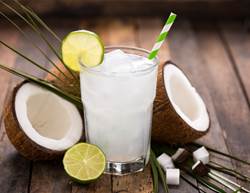- New research links artificially-sweetened and sugar-sweetened drinks to a higher risk of atrial fibrillation.
- Atrial fibrillation is linked to a higher risk of stroke and heart attack.
- It’s not clear what's behind the link.
Atrial fibrillation is the most common type of irregular heart rhythm, impacting around half a million Australians. While several factors can lead to atrial fibrillation (or AFib), research has uncovered a new one to keep on your radar: a link between sweetened drinks and the heart condition.
The study was published in the American Heart Association’s journal Circulation: Arrhythmia and Electrophysiology. It analysed data from more than 200,000 adults who didn’t have AFib when they enrolled in the UK Biobank, a biomedical database and research resource, between 2006 and 2010. After about 10 years, the researchers followed up and found that there were 9,362 cases of AFib in the study participants.
The researchers found a link between what people drank and their risk of AFib. People who drank about 67 ounces (1,980ml) or more of artificially sweetened drinks had a 20% higher risk of AFib than those who didn’t have any sweetened drinks. (That’s about one 12-ounce or 355ml drink six days a week.) Those who said they had 67 ounces or more of a sugar-sweetened beverage had a 10% higher risk of AFib.
But people who said they had about 34 ounces (1,000ml) or less of pure fruit juice a week had an 8% lower risk of atrial fibrillation.
When you have atrial fibrillation, the normal beating in the upper chambers of the heart is irregular, and blood doesn’t flow as well as it should from the atria to the lower chambers of the heart, according to the Centers for Disease Control and Prevention (CDC). Atrial fibrillation can happen in brief episodes, or it can be permanent.
But why might certain sweetened drinks increase your risk of AFib? Here’s the deal.
What’s behind the link?
The researchers stressed that the findings simply found a link between sweetened drinks and a higher risk of atrial fibrillation. Meaning, they don’t say that having sweetened drinks definitely raises your risk of atrial fibrillation. However, they noted that a sweetened drink habit could play a role in your risk, or may be a predictor of other traditional risk factors.
Those traditional risk factors, according to the CDC, include:
- Getting older
- High blood pressure
- Obesity
- European ancestry
- Types of diabetes
- Heart failure
- Ischemic heart disease
- Hyperthyroidism
- Chronic kidney disease
- Moderate to heavy alcohol use
- Smoking
- Enlargement of the chambers on the left side of the heart
The study found that participants who had more artificially sweetened beverages were also more likely to have a higher body mass index (BMI) and type 2 diabetes, and both of those are traditional risk factors for AFib.
But it’s also possible that the drinks themselves play a direct role. Insulin resistance, which is when cells in your muscles, fat, and liver don’t respond well to insulin and can’t easily take up glucose from your blood, along with the body’s individual response to different sweeteners could factor in, lead study author Dr Ningjian Wang said in a statement.
Caffeine content may also play a role, says cardiac electrophysiologist Dr Shephal Doshi. “When you’re drinking two litres of soda every week, that’s a fair amount of caffeine going into your body, and caffeine has been linked to arrhythmia,” he says. (Arrhythmia is when the heart has an abnormal rhythm.)
Drinking a lot of artificial or sugar-sweetened beverages along with some traditional risk factors seemed to raise one’s risk of AFib even more. Smokers who drank more than 67 ounces (1,980ml) per week of sugar-sweetened beverages, for example, had a 31% higher risk of AFib.
“We don’t have much evidence from human studies on the health effects of artificial sweeteners, so this study is important in ‘filling the gap’ in our knowledge about them so that we can make strong, evidence-based dietary recommendations,” says professor and research dietitian Penny M. Kris-Etherton.
“What is clear that sugar-sweetened beverages and artificially-sweetened beverages aren’t offering any protection against AFib,” says dietitian Jessica Cording. “This is pointing more in the direction of choosing unsweetened beverages [as] a better approach.”
Atrial fibrillation symptoms
According to the American Heart Association (AHA), symptoms of AFib may include:
- A quivering or fluttering heartbeat
- General fatigue
- A rapid and irregular heartbeat
- “Thumping” in the chest
- Dizziness
- Shortness of breath and anxiety
- Weakness
- Faintness or confusion
- Fatigue when exercising
- Sweating
- Chest pain or pressure
What to do if you experience atrial fibrillation
If you have an atrial fibrillation episode, it’s best to get it checked out, says cardiac electrophysiologist Dr Nikhil Warrier. But how fast you need to act depends on what you’re experiencing.
“If you have occasional fluttering, that definitely warrants a call to your doctor but you don’t need to rush to the emergency room,” Dr Doshi says. “But if you feel bad, dizzy and sick, you should go to the ER.”
If you also notice chest pain or pressure with your symptoms, call 000 right away; you might be having a heart attack.
Atrial fibrillation symptoms aren’t something to write off, no matter how mild they are. “People who have AFib have a higher risk of stroke and death from stroke,” Kris-Etherton says. “They also have a higher risk of having a heart attack. AFib is a serious condition that requires immediate medical attention."
AFib tends to co-exist with heart failure, making that another aspect to have on your radar, Dr Warrier says.
Treatment varies. “It usually depends on how long patients have had AFib, how bothersome symptoms are, and the underlying cause of the AFib,” Dr Warrier says. However, he says it usually involves trying to lower the risk of stroke to prevent blood clots with blood thinning medications and healthy lifestyle factors to try to control AFib risk factors.
How to cut back on sweetened drinks
If you and want to cut back on artificially sweetened and sugar-sweetened drinks, Cording says there are a few things you can do.
One is to have these drinks less frequently and to treat them more as an indulgence. “You don’t have to go from having it daily to never having it overnight,” Cording says. If you’re having these beverages daily right now, she suggests scaling back to having them two to three times a week instead.
“You can also have a smaller size. I’ve seen that work well for some people,” Cording says.
But Cording says it’s important to think about where these drinks fit into your overall diet pattern. “If you’re not eating a lot of sugar or sweetened products in other areas of your diet, the impact of these drinks might be different than if you’re having sugar and artificial sweetener from other sources, too,” she says.
Basically, if you have sweetened drinks here and there, you’re probably just fine to keep on doing the same. But if it’s a regular thing for you, it’s worth reconsidering your habit.










